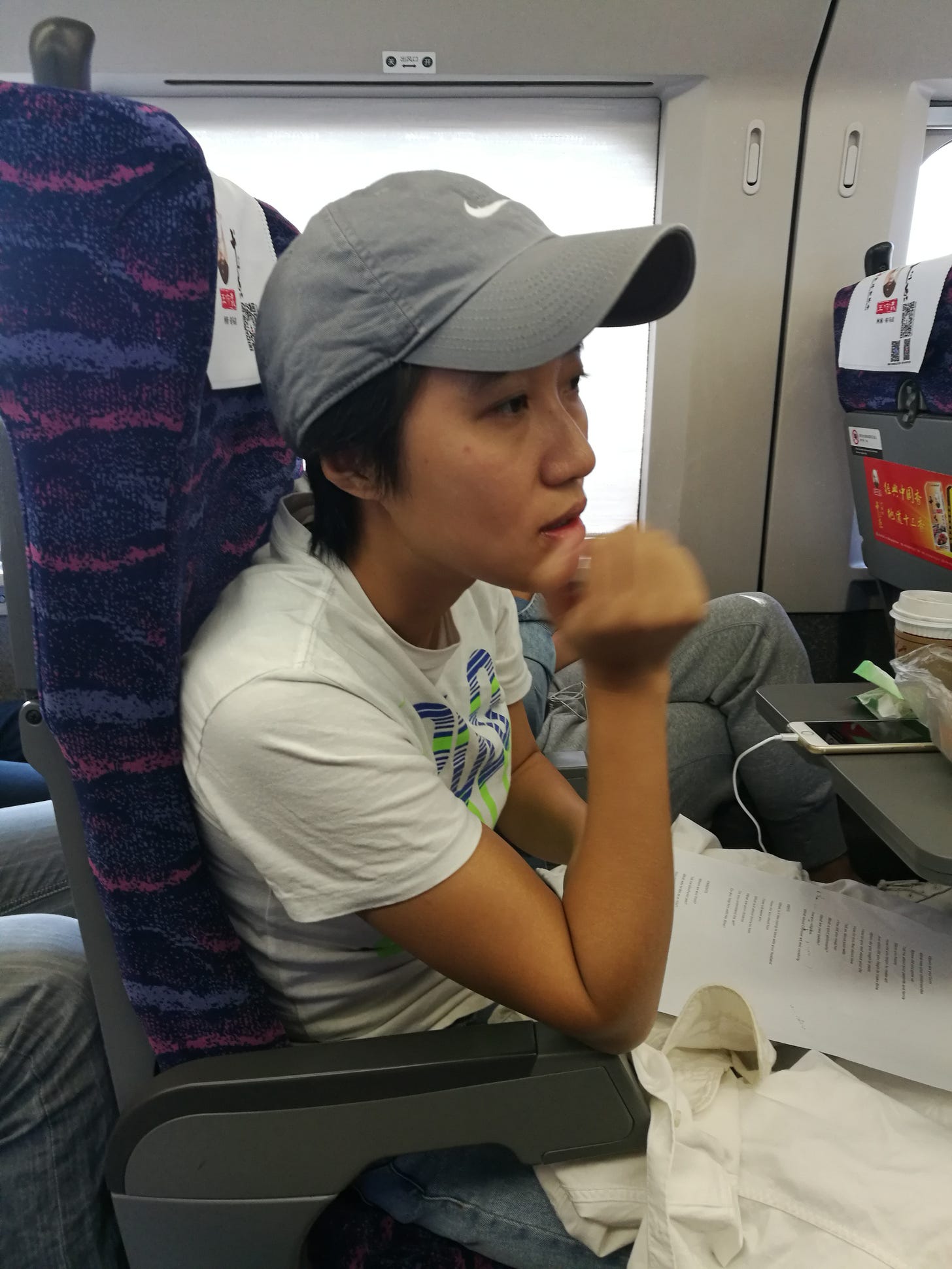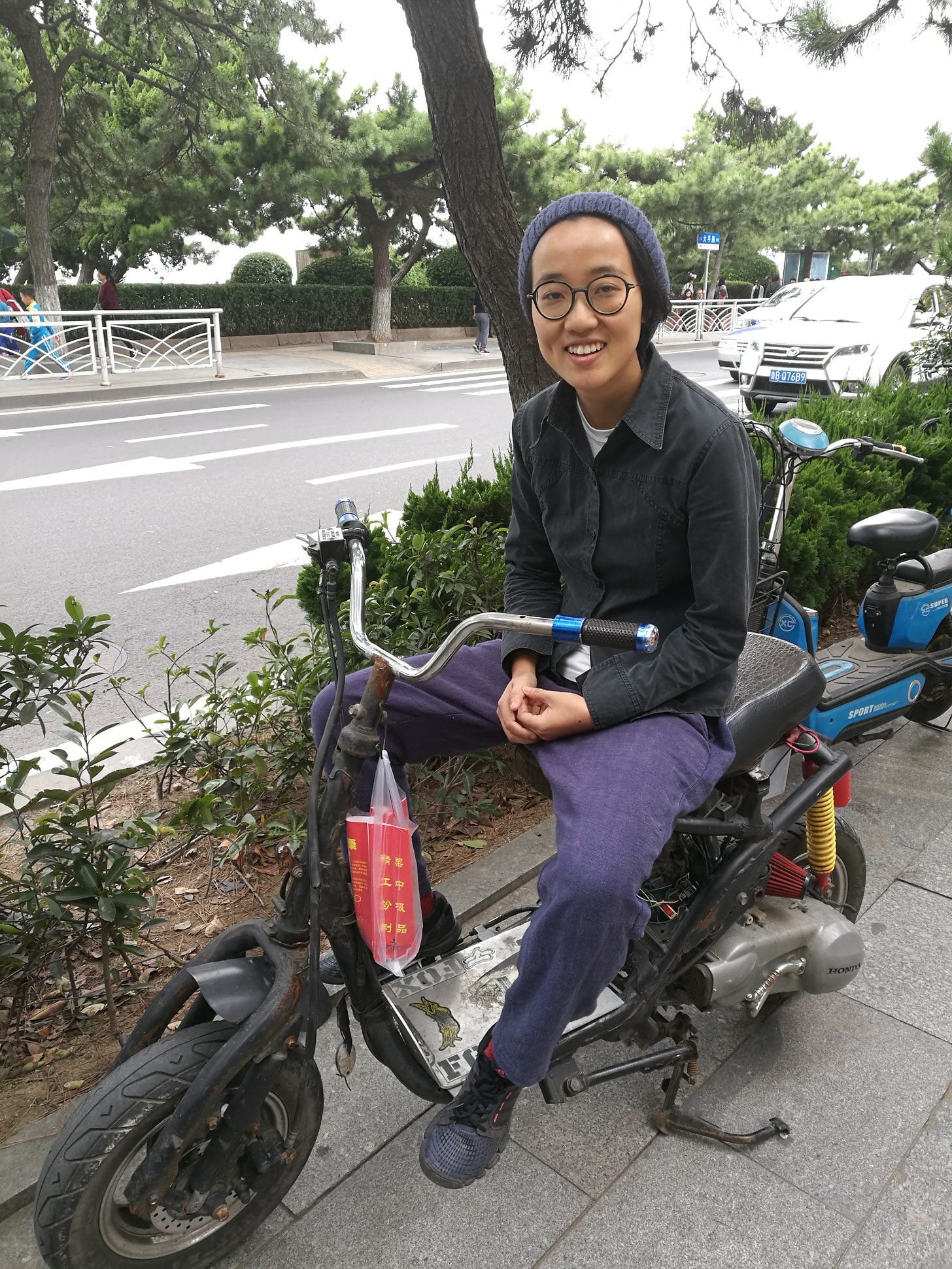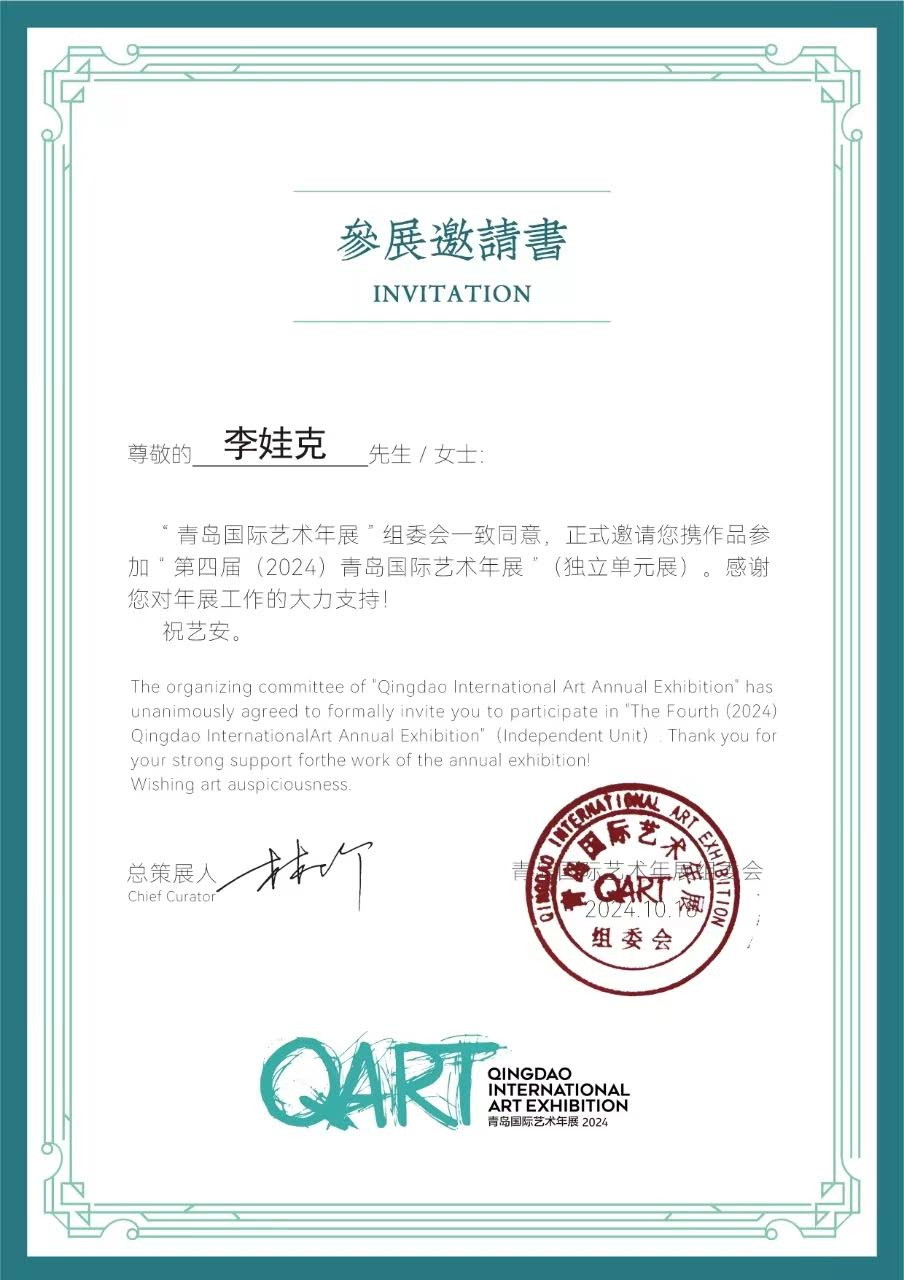This is my dear friend Wake
Wake Li is an Iggyesque copy
Chinese style. There is too little space here to write about him fully, so I will leave links for you to view his work here. (I host his work on my website and have just created a site for him which is under construction here.)
Wake has just returned from the North East and is back in Qingdao. I am very excited. I haven’t seen him, or Yuan, or Li since I left in 2019. That seems like another era, or as LP Hartley wrote in The Go-Between, “the past is a foreign country; they do things differently there.” Pre-pandemic, pre-then and now.
This is my one day alone without Violette. Just one day. I have eight hours. Eight glorious free hours. I rush down to the metro. They are there—Bai and Wake—still in love, another couple with a 30-year age difference. And Yuan, who has come from Fujian, and Li, from the mountains, near Qilu hospital where I had my brain operation.
We are an odd bunch—I call us the outsiders - Wàirén. When I met Yuan, introduced to me by Tao Gu in 2016, it was instant attraction. Yuan, with a curious mind, fascinated by facts, independent, restless, proved to me that yes, you can live outside the system here, with your own rules—just, you have to be brave. On reflection, you need to be brave anywhere.
YUAN
“I don’t want to marry. I will go where I want. I can work in a bar, a restaurant, make videos, sell online. Anyone can do this.” I remember her telling me this at our first meeting. She had just bought a small bike and zipped me to her house in the old Qingdao quarter. She was then torn between her love for her culture and her desire to leave. I promised her that one day she would come with me to France, to Tuchan, my village. Through Yuan, I met Wake, Bai, and Lin.
Lin hosts the Qingdao International Film Festival
which you won’t find online. It is only spread by word of mouth, making it an exclusive place to screen your work. Each year the venue changes, and there are only between 10-15 viewers. Yet, it works, and Lin has deep affiliations with China’s great storytellers, such as Hao Zhou — the gentle man who made the thrilling The Chinese Mayor in 2015. (I met him the year after that, in 2016.)
Lin creates social documentaries which are hours long. The biggest issue is the subtitles. I will do them for you, I say the day in the tea shop as the rain pitters down like a monsoon without the jungle.
Wake and Bai met when she was very young. A school leaver. She loved him instantly and told him she would come back for him when she was 18. She did, they married and left to live in the North West. Bai is a teacher, and we exchange wonderful emails where she talks about life there, not about art, or change. It is so cold sometimes they have to crack open the ice in the water containers.
Wake has arranged a meeting for us
in a restaurant in the old town of Qingdao, not far from the port. It feels so wonderful to be here once more; that energy of the arts, and life loved, and love on the edge returns. Simply that. Love on the edge.
The Friends meet regularly here. Below Qingdao moves into it’s day as the friends arrive. There are singers, guitarists, and Mo, a from Beijing who speaks French with the sweetest accent. Wake brings out his new creation, a puppet of a young Gazan child, which centres on his latest performance about the children trapped in the middle of war—directed at both Hamas and the IDF.
Their speakeasy...
The food comes in slowly, plate by mouth-watering plate,
(Images taken with permission and knowledge I will post them here.)
We eat while Bai keeps an eye on Wake to make sure he doesn’t drink too much. Báijiǔ—the potent white liquor, 60–70%, loved for over 5,000 years—is knocked back: one, two, three, Gānbēi—Cheers, and down the hatch!
Eating in China is ceremonious, and drinking is part of the celebration. Every few minutes, there’s a serious knocking with the shooter glasses on the table… bam, bam, bam, and thanks given to the company around the table, then a poem recited, or a stanza, and again, one, two, three, Gānbēi—Cheers, and down the hatch!
(The Book of Han (Hanshu) is a key historical text documenting the Western Han Dynasty (206 BCE – 9 CE), written by historian Ban Gu and his family. It is one of the "Twenty-Four Histories," covering politics, economy, culture, and significant events, offering valuable insights into early Chinese history, including etiquette and practices like the drinking culture. Alcohol holds a place of utmost importance in etiquette. “Drink enough to be polite, but overindulge, and you will harm your virtue.
I cry during our day
For time passing, for friendship, for the obstacles in our way to deeper communication and connection, and also, not giving a damn about the language barriers—for feelings, nuances, and gestures I understand. Passion I feel, love I know, friendship we share; these are without barriers or boundaries, unfettered and pure.
When I leave, I have a profound sensation of longing. I’m surrounded by souls walking the same path, living without many material things as they do—not owning a car, sharing a tiny space with my daughter and granddaughter, and living out of a small case, as long as I can share and express. Like my Chinese friends, I can forgo luxury. I turn and hold Wake, Bai, and Yuan in my arms. “I will see you all in December. Promise. I love you all.”
On the train back home, I think of the Iranian officer who told me something I shall never forget when I first arrived in Iran in the early 90’s. “To speak the truth, you must be brave, and to be brave, you sometimes have to be a bit mad!”
This is what Wake is—brave, and just that tipsy bit mad.
Whilst writing this I got this message from Wake. He has just been selected for a major show in Qingdao. I am delighted!
Huangdao Lu—the old quarter of Qingdao
In 2017, there was talk of the old area in Qingdao being knocked down to make way for a tourist district. From St. Michael's Church, the iconic landmark of German dominance in Qingdao, there were winding streets, the municipal archives, and the local shopkeepers and owners of the old dwellings built by the Germans during their occupation of Qingdao between 1898 and 1914. The German name for Qingdao is Tsingtao (Yes, like the beer, world-famous—ads from the 60s even show parents giving it to their babies!). Germany obtained a lease of Tsingtao and the hinterland for ninety-nine years, which ended when the Japanese invaded, helped by the British, in the Siege of Tsingtao in 1914. The Japanese remained in China until 1945, fighting the Sino-Japanese War. The Chinese call this The War of Resistance to Japan. And no matter what, the Qingdaoites have clung onto Cino-German fused heritage with gusto and pride.
Wang Ying and I spoke with some locals, now in their 90s, who were children when the Japanese invaded and took over. One woman showed us the bullet that lodged in her head—a huge hole—yet she survived. They speak with warmth about the Germans, but fear and agitation when it comes to the Japanese. They cling to the homes they were born into, as did their parents. Yet, in 2017, the government decided it was the turn of the Zhongites to move.
(Since 1978, developers and entrepreneurial local governments in China have formed pro-growth coalitions, engaging in widespread urban housing demolition and redevelopment in lucrative areas, often involving large-scale forced relocation of residents. Watch The Chinese Mayor trailer here.)
So Wang Ying and I started filming. We are among the few people who went inside the dwellings to chat with the residents, and we now have a vast archive, which we are submitting to the municipal archives. My favourite place was Small Bar, Big Ideas, where locals crammed into a room the size of a pea, and within moments, it was filled with cigarettes, beer, and chatter. At first, they asked us to bring our ID to prove who we were.
"Not spies?" they laughed.
So we took our school ID and residence cards, and then they gave us carte blanche to film. The owner, hard of hearing and non-verbal, held court over the men, the meals, and the money.
And now, it is all gone. New, brand spanking shiny buildings stand in their place. I do not recognise it, and I feel sad. Why? For myself? In a sense, yes, but mostly for the locals. Ying, Xihu and the kids and me return to the Stinky Tofu bar, where the seller tells us,“since redevelopment, the energy is so different now, and business is not as good.”
“Why wouldn’t it be as good?” Wang Ying asks.
“Because this is now upmarket—before, it was local. I liked my locals, now it is mainly tourists. The locals have been driven away, so, in winter months, less business..”
“Can you complain to the local government?”
“Of course, but it’s too late; it is done. The milk is soured.”
I remember how I sat with an entire family in their compound for a photo before the decision to rebuild in 2016. As we turn to go, the seller says. “No matter what, we have our memories. I still have my job and you’ve come back here after all these years; no one can ever wipe away our memories.”
Here is a short segment that I compiled. From this a much larger piece will be created when I go back to China in the winter time, 2024.
I finish with this quote by Confucius: “Study the past if you would define the future.”








Hello Jeanne, I just finished reading your Substack and watching your latest video , and it was a joy to see your journey back to China and the beautiful way you captured the changes there. It must have been heartwarming to reconnect with your artist friends and witness the resilience and kindness of the people, in spite of everything. And it’s always nice to see Ying on camera :)
Thanks again for sharing this part of your life with us . Love xoxo
Oh Jeanne– I'm overjoyed that you've been able to make it back and spend time with your loved ones there. The video of the man playing guitar in a cowboy hat brought me to tears... it felt like a reflection of what I experience daily as a bridge between the east and the west. There is so much that I want to share, but perhaps over zoom or a glass of bai jiou? Please let me know when you book your winter trip, I would very much love to coordinate a visit and meet you out there. Sending love from LA! xx